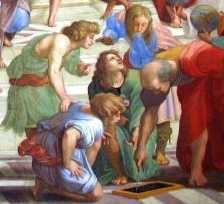The word debitos is from the verb debeo which according to Fr. Britt's Dictionary of the Psalter (1928) means "to owe, to be indebted" so I suppose it could be translated "fitting," "due," or "appropriate."Aeterna Christi munera, .....The eternal gifts of Christ,
Apostolorum gloriam, ..........The glory of the Apostles,
Palmas et hymnos debitos, .Songs of triumph and becoming hymns,
Laetis canamus mentibus. ...Let us sing with joyful hearts.
(translation based on Fr. M. Britt OSB Hymns of the Breviary and Missal
I chose the word for the title of this blog because the Church has a fitting, appropriate, becoming, due, or assigned hymn for Christians to sing as part of the Liturgy of the Hours. This blog is where I plan to collect my thoughts and attempts at translating these hymns.
I say "attempts" because I am not really qualified for the task. Granted, I probably know much more Latin than the average person, but I am by no means an expert like, say, Fr. John Zuhlsdorf, author of the continually interesting blog What Does the Prayer Really Say. Back when he was assigned to my parish St. Raphael I used to regularly assault him with questions about what the Latin prayers and hymns really said. He patiently and thoroughly answered them and offered friendly translation advice and an occasional grilling about the ablative absolute. (This was way back when he was watching over the forum at catholic.org, before he ever began wdtprs.com.)
He did acknowledge how difficult hymns in particular can be to translate well. I think this is because:
- the syntax can be confusing
- the vocabulary can sometimes be obscure
- allusions to Holy Scripture, Tradition or classical literature can be difficult to catch
In any case, my desire to understand what I am singing is stronger than my apprehension about the difficulties. Perhaps I will look very amateurish. That's OK with me. I am very open to correction.

No comments:
Post a Comment